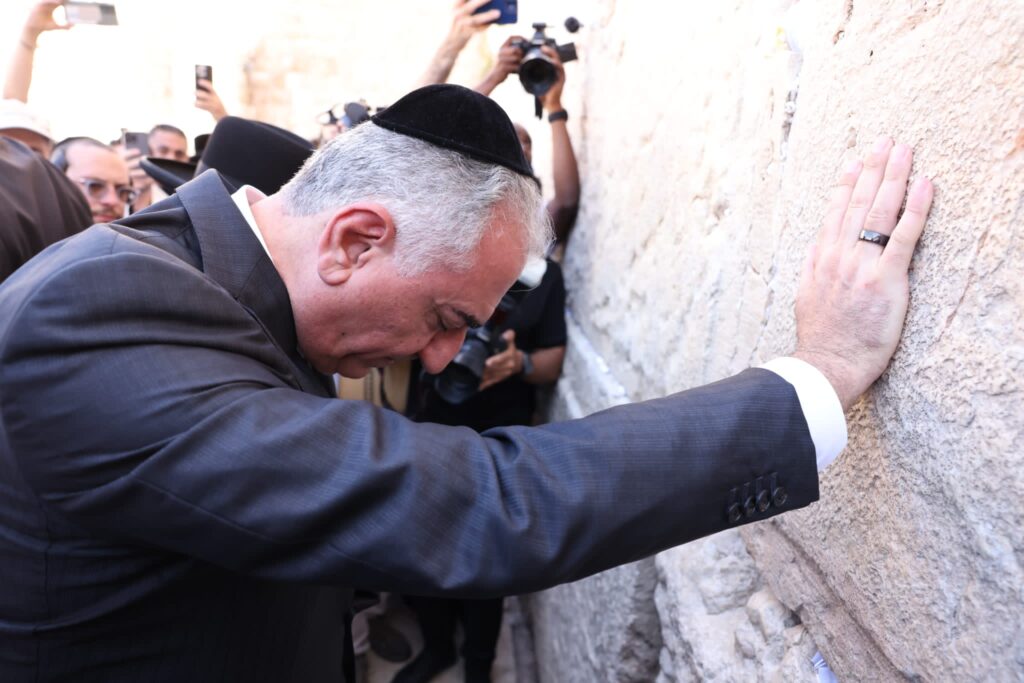What Would the Middle East Look Like With a Democratic Iran?
It would be the most important international development since the fall of Communism.

The image of the heir to the Iranian Pahlavi dynasty and nominal crown prince of Iran, Reza Pahlavi, praying with a yarmulke on the Western Wall in Jerusalem is the most powerful rebuke to Islamic Republic he has made in the entirety of his time in exile.
He is visiting Israel this week to mark Holocaust Remembrance Day, and it is an appealing sight: the only democratic Middle Eastern state hosting the exiled scion of Iran’s last government, an avowed democrat, offering a glimpse of a different future.
Revolutions are built around symbols, like Ayatollah Khomeini in the 1970’s. The bearded, turbaned, scowling cleric was clear enough on what he wanted, but his proclamations were sufficiently vague that they allowed an unlikely coalition of Tehrani women, leftist union members, and Iran’s old secular nationalists to rally behind him. Foolishly, as it turned out, but effectively enough to oust the last Pahlavi Shah.
For Reza Pahlavi this trip is a similarly brilliant symbolic stroke. The picture of a potential Shah paying homage to Cyrus amidst a people who still remember him instead suggested a different future for Iran than Ayatollah Khomeini’s: a future that is free from terror, democratic, with a friendly Iran bookending the Middle East with Israel. An Iran defined by its reliability and stability, and once again a society that is growing.

Almost certainly there will be no immediate revolution in Iran. The protests over the brutal killing of Mahsa Amini in September have been subdued. Iran’s government has done a brutal job of dividing and arming society, and in putting down the unrest killed hundreds. But the discontent over a government that produces no hope and no future burns.
What would the Middle East look like with a democratic Iran? Mr. Pahlavi’s father, the late Shah, had friendly if quiet relations with Israel. Both states were aligned with America. They were concerned with many of the same threats, and cooperated extensively through oil sales and infrastructure projects like, say, dams. Though government-to-government relations could be sensitive, many Israelis lived and worked in Iran.
Today there would be much less sensitivity. A democratic Iran would certainly be friendly to Israel and America and amid the euphoria of revolution Iran would receive tremendous diplomatic support internationally. In the West there would also be a renewed emphasis on democracy and values-based allies in the region, perhaps helping reconcile Europeans and Israelis.
Instead of a Sunni-Shia divide, the region would be divided between democrats and dictators, the de jure distinction the Biden Administration claims to see in its 2022 National Security Strategy. The value of having a major democratic oil-producing state in the Middle East might well deepen the American schism with Saudi Arabia and other challenging regional allies.
America would likely accommodate Iranian wishes and prerogatives in the Gulf, which Iran being Iran would still be many. As a result, the monarchies of the Gulf might tighten their relationship with Communist China, assured that Beijing was interested most in stability and assuredly uninterested in democracy.
Almost certainly, both Red China and Russia would hate the idea of a democratic Iran led by the son of a American ally. Almost certainly they would throw their weight against a revolution, and just as certainly any new government would remember it and despise them. A China-friendly Gulf, though, would in the worst case comprise fundamentally defensive commercial states, as they are now.
Iran’s revolutionary ideology would also be a spent force. Iran’s militias like Hezbollah would most likely try to entrench themselves forcefully further into their host governments, creating military dictatorships in all but name. That is the way Mr. Putin and the security services conquered Yeltsin’s Russia. Russia would be willing to supply the guns to these states, if they survived, but a distracted Russia would be far less of a concern than an aggressive Iran.
The Iran Mr. Pahlavi invoked at the Western Wall would be the most important international development since the fall of communism. It would not end extremism, nor violence, nor poverty: but the fall of Khomeinism would make the world a better place, for Iranians and Israelis alike.
